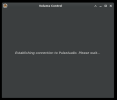There is sound in Telegram and Falkon.
I don't even know where to start.
GTK-mixer opens and works fine.
But "pulsa" has been hanging like this for about 30 minutes, the clock is spinning... see picture.
I don't even know where to start.
# cat /dev/sndstat
Bash:
Installed devices:
pcm0: <ATI R6xx (HDMI)> (play)
pcm1: <Realtek ALC887 (Rear Analog)> (play/rec) default
pcm2: <Realtek ALC887 (Front Analog)> (play/rec)
pcm3: <Realtek ALC887 (Internal Digital)> (play)
No devices installed from userspace. # sysctl hw.snd.default_unit
Code:
hw.snd.default_unit: 1GTK-mixer opens and works fine.
But "pulsa" has been hanging like this for about 30 minutes, the clock is spinning... see picture.

